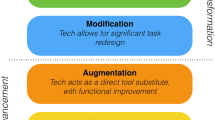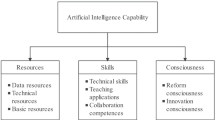Abstract
The application of information and communication technology in instruction is highly emphasized in the contemporary education of science teachers. This paper hence aims to explore science teachers’ perceptions of technological pedagogical content knowledge (TPACK) addressing teachers’ perceptions of the affordances of technology application in instruction. A total of 222 pre- and in-service science teachers in Singapore were surveyed. Structural equation models analysis was utilized to examine the model of TPACK involving the seven factors of technological knowledge (TK), pedagogical knowledge (PK), content knowledge (CK), technological content knowledge (TCK), technological pedagogical knowledge (TPK), pedagogical content knowledge (PCK), as well as synthesized knowledge of technology, pedagogy, and content (TPC). The results confirm the seven-factor model and indicate that the science teachers’ perceived TPC significantly and positively correlated with all the other TPACK factors. This paper further reveals the relationships between the science teachers’ perceptions of TPACK and their demographic characteristics such as teaching experience, gender, and age. The findings indicate that female science teachers perceive higher self-confidence in pedagogical knowledge but lower self-confidence in technological knowledge than males. Further, female in-service science teachers’ perceptions of TK, TPK, TCK, and TPC significantly and negatively correlate with their age.

Similar content being viewed by others
References
Albirini A (2006) Teachers’ attitudes toward information and communication technologies: the case of Syrian EFL teachers. Comput Educ 47(4):373–398. doi:10.1016/j.compedu.2004.10.013
Allan WC, Erickson JL, Brookhouse P, Johnson JL (2010) Teacher professional development through a collaborative curriculum project—an example of TPACK in Maine. TechTrends 54(6):36–43
Angeli C, Valanides N (2005) Preservice elementary teachers as information and communication technology designers: an instructional systems design model based on an expanded view of pedagogical content knowledge. J Comput Assis Learn 21(4):292–302. doi:10.1111/j.1365-2729.2005.00135.x
Angeli C, Valanides N (2009) Epistemological and methodological issues for the conceptualization, development, and assessment of ICT-TPCK: advances in technological pedagogical content knowledge (TPCK). Comput Educ 52(1):154–168. doi:10.1016/j.compedu.2008.07.006
Archambault LM, Barnett JH (2010) Revisiting technological pedagogical content knowledge: exploring the TPACK framework. Comput Educ 55(4):1656–1662. doi:10.1016/j.compedu.2010.07.009
Archambault LM, Crippen K (2009) Examining TPACK among K-12 online distance educators in the United States. Contemp Issues Technol Teach Educ 9(1):71–88
Azevedo R (2004) Does adaptive scaffolding facilitate students? Ability to regulate their learning with hypermedia? Contemp Educ Psychol 29(3):344–370. doi:10.1016/j.cedpsych.2003.09.002
Bollen KA (1989) Structural equations with latent variables. Wiley-Interscience, New York
Braten I, Stromso HI (2006) Epistemological beliefs, interest, and gender as predictors of Internet-based learning activities. Comput Hum Behav 22(6):1027–1042. doi:10.1016/j.chb.2004.03.026
Browne MW, Cudeck R (1993) Alternative ways of assessing model fit. In: Bollen KA, Long JS (eds) Testing structural equation models, vol 21, pp 136–162. doi:10.1177/0049124192021002005
Butler D (2000) Gender, girls, and computer technology: what’s the status now? Clear House : J Educ Strateg Issues Ideas 73(4):225–229. doi:10.1080/00098650009600957
Chai CS, Koh JHL, Tsai CC (2010) Facilitating preservice teachers’ development of technological, pedagogical, and content knowledge (TPACK). Educ Technol Soc 13(4):63–73
Chai CS, Koh JHL, Tsai CC, Tan LWL (2011) Modeling primary school pre-service teachers’ Technological Pedagogical Content Knowledge (TPACK) for meaningful learning with information and communication technology (ICT). Comput Educ 57(1):1184–1193. doi:10.1016/j.compedu.2011.01.007
Cox S, Graham CR (2009) Diagramming TPACK in practice: using an elaborated model of the TPACK framework to analyze and depict teacher knowledge. TechTrends 53(5):61
Demetriadis S, Barbas A, Molohides A, Palaigeorgiou G, Psillos D, Vlahavas I, Tsoukalas I, Pombortsis A (2003) “Cultures in negotiation”: teachers’ acceptance/resistance attitudes considering the infusion of technology into schools. Comput Educ 41(1):19–37. doi:10.1016/S0360-1315(03)00012-5
Edelson DC (2001) Learning-for-use: a framework for the design of technology-supported inquiry activities. J Res Sci Teach 38(3):355–385. doi:10.1002/1098-2736(200103)38:3<355:AID-TEA1010>3.3.CO;2-D
Fornell C, Larcker DF (1981) Evaluating structural equation models with unobservable variables and measurement error. J Mark Res 18(1):39–50. doi:10.2307/3151312
Govender D, Govender I (2009) The relationship between information and communications technology (ICT) integration and teachers’ self-efficacy beliefs about ICT. Educ Change 13(1):153–165. doi:10.1080/16823200902943346
Graham CR (2011) Theoretical considerations for understanding technological pedagogical content knowledge (TPACK). Comput Educ 57(3):1953–1960. doi:10.1016/j.compedu.2011.04.010
Graham CR, Burgoyne N, Cantrell P, Smith L, St Clair L, Harris R (2009) TPACK development in science teaching: measuring the TPACK confidence of inservice science teachers. TechTrends 53(5):70–79
Guzey SS, Roehrig GH (2009) Teaching science with technology: case studies of science teachers’ development of technology, pedagogy, and content knowledge. Contemp Issues Technol Teach Educ 9(1):25–45. doi:10.1007/s10956-008-9140-4
Hair JF, Black WC, Babin BJ, Anderson RE (2006) Multivariate data analysis, 6th edn. Prentice Hall, Upper Saddle River
Harris J, Mishra P, Koehler M (2009) Teachers’ technological pedagogical content knowledge and learning activity types: curriculum-based technology integration reframed. J Res Technol Educ 41(4):393–416. doi:10.1207/s15326985ep2803_7
Hennessy S, Wishart J, Whitelock D, Deaney R, Brawn R, Velle L, Mcfarlane A et al (2007) Pedagogical approaches for technology-integrated science teaching. Comput Educ 48(1):137–152. doi:10.1016/j.compedu.2006.02.004
Hermans R, Tondeur J, van Braak J, Valcke M (2008) The impact of primary school teachers’ educational beliefs on the classroom use of computers. Comput Educ 51(4):1499–1509. doi:10.1016/j.compedu.2008.02.001
Hoffman JL, Wu HK, Krajcik JS, Soloway E (2003) The nature of middle school learners’ science content understandings with the use of on-line resources. J Res Sci Teach 40(3):323–346. doi:10.1002/tea.10079
Hsu YS, Wu HK, Hwang FK (2007) Fostering high school students’ conceptual understandings about seasons: the design of a technology-enhanced learning environment. Res Sci Educ 38(2):127–147. doi:10.1007/s11165-007-9041-1
Hu PJH, Clark THK, Ma WW (2003) Examining technology acceptance by school teachers: a longitudinal study. Inf Manag 41(2):227–241. doi:10.1016/S0378-7206(03)00050-8
Huang SL, Fraser BJ (2008) Science teachers’ perceptions of the school environment: gender differences. J Res Sci Teach 46(4):404–420. doi:10.1002/tea.20284
Jacobson MJ (2007) A design framework for educational hypermedia systems: theory, research, and learning emerging scientific conceptual perspectives. Educ Technol Res Dev 56(1):5–28. doi:10.1007/s11423-007-9065-2
Jang SJ, Chen KC (2010) From PCK to TPACK: developing a transformative model for pre-service science teachers. J Sci Educ Technol 19(6):553–564. doi:10.1007/s10956-010-9222-y
Jimoyiannis A (2010) Designing and implementing an integrated technological pedagogical science knowledge framework for science teachers professional development. Comput Educ 55(3):1259–1269. doi:10.1016/j.compedu.2010.05.022
Klassen RM, Chiu MM (2010) Effects on teachers’ self-efficacy and job satisfaction: teacher gender, years of experience, and job stress. J Educ Psychol 102(3):741–756. doi:10.1037/a0019237
Kline RB (2010) Principles and practice of structural equation modeling, 3rd edn. The Guilford Press, New York
Koehler MJ, Mishra P (2005) What happens when teachers design educational technology? The development of technological pedagogical content knowledge. J Educ Comput Res 32(2):131–152. doi:10.2190/0EW7-01WB-BKHL-QDYV
Koehler MJ, Mishra P (2009) What is technological pedagogical content knowledge (TPACK)? Contemp Issues Technol Teach Educ 9(1):60–70
Koh JHL, Divaharan S (2011) Developing pre-service teachers’ technology integration expertise through the TPACK-developing instructional model. J Educ Comput Res 44(1):35–58. doi:10.2190/EC.44.1.c
Koh JHL, Chai CS, Tsai CC (2010) Examining the technological pedagogical content knowledge of Singapore pre-service teachers with a large-scale survey. J Comput Assis Learn 26(6):563–573. doi:10.1111/j.1365-2729.2010.00372.x
Lee MH, Tsai CC (2010) Exploring teachers’ perceived self efficacy and technological pedagogical content knowledge with respect to educational use of the World Wide Web. Instr Sci 38(1):1–21. doi:10.1007/s11251-008-9075-4
Lee SWY, Tsai CC, Wu YT, Tsai MJ, Liu TC, Hwang FK, Lai CH, Liang JC, Wu HC, Chang CY (2011) Internet-based science learning: a review of journal publications. Int J Sci Educ 33(14–15):1893–1925. doi:10.1080/09500693.2010.536998
Liang JC, Tsai CC (2008) Internet self-efficacy and preferences toward constructivist Internet-based learning environments: a study of pre-school teachers in Taiwan. Educ Technol Soc 11(1):226–237
Linn MC, Clark D, Slotta JD (2003) WISE design for knowledge integration. Sci Educ 87(4):517–538. doi:10.1002/sce.10086
Lundeberg MA, Bergland M, Klyczek K, Hoffman D (2003) Using action research to develop preservice teachers’ beliefs, knowledge and confidence about technology. J Interact Online Learn 1(4):1–16
Mishra Punya, Koehler MJ (2006) Technological pedagogical content knowledge: a framework for teacher knowledge. Teach Coll Rec 108(6):1017–1054. doi:10.1111/j.1467-9620.2006.00684.x
Mishra P, Koehler MJ, Kereluik K (2009) The song remains the same: looking back to the future of educational technology. TechTrends 53(5):49
Niederhauser DS, Stoddart T (2001) Teachers’ instructional perspectives and use of educational software. Teach Teach Educ 17(1):15–31. doi:10.1016/S0742-051X(00)00036-6
Niess ML (2005) Preparing teachers to teach science and mathematics with technology: developing a technology pedagogical content knowledge. Teach Teach Educ 21(5):509–523. doi:10.1016/j.tate.2005.03.006
Nunnally JC, Bernstein IH (1994) Psychometric theory, 3rd edn. McGraw-Hill, New York
Polly D (2011) Teachers’ learning while constructing technology-based instructional resources. Br J Educ Technol 42(6):950–961. doi:10.1111/j.1467-8535.2010.01161.x
Puntambekar S, Kolodner JL (2005) Toward implementing distributed scaffolding: helping students learn science from design. J Res Sci Teach 42(2):185–217. doi:10.1002/tea.20048
Sadik A (2006) Factors influencing teachers’ attitudes toward personal use and school use of computers: new evidence from a developing nation. Eval Rev 30(1):86–113. doi:10.1177/0193841X05276688
Schermelleh-engel K, Moosbrugger H, Müller H (2003) Evaluating the fit of structural equation models: tests of significance and descriptive goodness-of-fit measures. Methods Psychol Res Online 8(2):23–74
Schmidt DA, Baran E, Thompson AD, Mishra P, Koehler MJ, Shin TS (2009) Technological pedagogical content knowledge (TPACK): the development and validation of an assessment instrument for preservice teachers. J Res Technol Educ 42(2):123–149
Shih M, Feng J, Tsai CC (2008) Research and trends in the field of e-learning from 2001 to 2005: a content analysis of cognitive studies in selected journals. Comput Educ 51(2):955–967. doi:10.1016/j.compedu.2007.10.004
Shulman LS (1986) Those who understand: knowledge growth in teaching. Educ Res 15(2):4–14. doi:10.2307/1175860
Shulman LS (1987) Knowledge and teaching: foundations of the new reform. Harv Educ Rev 57(1):1–22
Sime D, Priestley M (2005) Student teachers’ first reflections on information and communications technology and classroom learning: implications for initial teacher education. J Comput Assis Learn 21(2):130–142. doi:10.1111/j.1365-2729.2005.00120.x
Sörbom D, Jöreskog KG (1982) The use of structural equation models in evaluation research. In: Fornell C (ed) A second generation of multivariate analysis v2 measurement and evaluation. Praeger, Westport, pp 381–418
Thompson AD, Mishra P (2007–2008) Breaking news: TPCK becomes TPACK! J Comput Teach Educ 24(2):38–64
Thorndike RM (2005) Measurement and evaluation in psychology and education. Upper Pearson Prentice Hall, Saddle River
Tsai CC (2001) The interpretation construction design model for teaching science and its applications to Internet-based instruction in Taiwan. Int J Educ Dev 21(5):401–415. doi:10.1016/S0738-0593(00)00038-9
Usluel YK (2007) Can ICT usage make a difference on student teachers’ information literacy self-efficacy. Library Inf Sci Res 29(1):92–102. doi:10.1016/j.lisr.2007.01.003
Voogt J, Fisse P, Pareja Roblin N, Tondeur J, van Braak J (in press) Technological pedagogical content knowledge—a review of the literature. J Comput Assist Learn. doi:10.1111/j.1365-2729.2012.00487.x
Web M, Cox M (2004) A review of pedagogy related to information and communications technology. Technol Pedagog Educ 13(3):235–286. doi:10.1080/14759390400200183
Wen JR, Shih WL (2008) Exploring the information literacy competence standards for elementary and high school teachers. Comput Educ 50(3):787–806. doi:10.1016/j.compedu.2006.08.011
Yuen AHK, Ma WW (2008) Exploring teacher acceptance of e-learning technology. Asia Pac J Teach Educ 36(3):229–243. doi:10.1080/13598660802232779
Yurdakul IK, Odabasi HF, Kilicer K, Coklar AN, Birinci G, Kurt AA (2011) The development, validity and reliability of TPACK-deep: a Technological Pedagogical Content Knowledge scale. Comput Educ 58(3):964–977. doi:10.1016/j.compedu.2011.10.012
Acknowledgments
This study was, in part, supported by the National Science Council, Taiwan, under grant numbers NSC-97-2511-S-011-003-MY3 and NSC-98-2511-S-011-005-MY3.
Author information
Authors and Affiliations
Corresponding author
Rights and permissions
About this article
Cite this article
Lin, TC., Tsai, CC., Chai, C.S. et al. Identifying Science Teachers’ Perceptions of Technological Pedagogical and Content Knowledge (TPACK). J Sci Educ Technol 22, 325–336 (2013). https://doi.org/10.1007/s10956-012-9396-6
Published:
Issue Date:
DOI: https://doi.org/10.1007/s10956-012-9396-6




